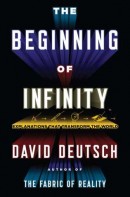 The second book by Deutsch, a physicist and pioneer of quantum computation, has gotten strong — if partly befuddled — notices. Nathaniel Stein says, “Deutsch’s world-view . . . is so novel that even a book so sparklingly clear in both its prose and its conception is, at times, quite confusing. But a reader can be grounded by the most important strand of this many-stranded world-view: the one that focuses on the importance of people, by considering what, exactly, people are.”
The second book by Deutsch, a physicist and pioneer of quantum computation, has gotten strong — if partly befuddled — notices. Nathaniel Stein says, “Deutsch’s world-view . . . is so novel that even a book so sparklingly clear in both its prose and its conception is, at times, quite confusing. But a reader can be grounded by the most important strand of this many-stranded world-view: the one that focuses on the importance of people, by considering what, exactly, people are.”
OK, maybe that doesn’t clarify much. But reviewers agree that the scope of Deutsch’s interest — which extends from science to philosophy, mathematical infinity, aesthetics, and elsewhere — makes him a thrilling read. The second paragraph of David Albert’s review, in which he compares the book to Burton’s Anatomy of Melancholy, is a keeper. It begins: “It hardly seems worth saying (to begin with) that the chutzpah of this guy is almost beyond belief, and that any book with these sorts of ambitions is necessarily, in some overall sense, a failure, or a fraud, or a joke, or madness.” He liked the book, a lot.
John Horgan admits he was probably assigned to review the book by editors who thought he would entertainingly slam it — Horgan’s terrific 1996 book The End of Science takes a decidedly more pessimistic view about how much more the field can teach us — but he ended up being inspired by Deutsch’s sunnier view, even though he writes, “Deutsch’s optimism sometimes resembles that of a man standing on a mountaintop, high above the problems afflicting us ordinary folk in the lowlands.” Horgan says:
Making the case for science’s open-endedness, Mr. Deutsch mounts a compelling challenge to scientific reductionism, which explains all phenomena in terms of their physical components. Yes, atomic theory, chemistry and genetics have worked spectacularly well at explaining many features of nature. But small-scale processes, the author notes, spawn so-called emergent phenomena that require understanding on their own terms. Bodies give rise to minds, which in turn give rise to ideas, which have no specific physical properties but can nonetheless influence human behavior in profound ways, as the Enlightenment itself demonstrates.
You can watch Horgan and Deutsch discuss the book and other subjects here. The clip is worth watching on a purely visual level, too, since Deutsch is a sleepy-eyed, bowl-haired genius who looks like he might have been designed by Jim Henson.
The Economist says that Deutsch’s first book, The Fabric of Reality, made him many fans, who will not be disappointed in the follow-up: “The Beginning of Infinity is equally bold, addressing subjects from artificial intelligence to the evolution of culture and of creativity; its conclusions are just as profound.”
The Beginning of Infinity by David Deutsch
Viking, 496 pp., $30.00

